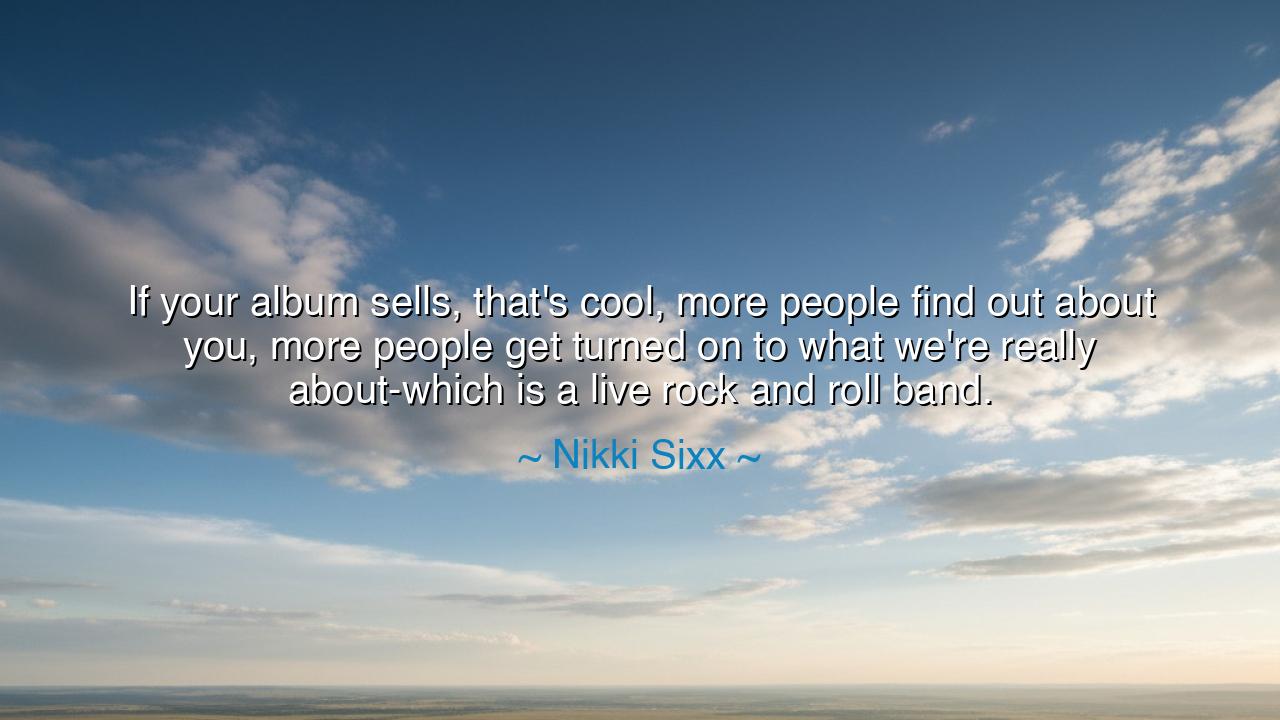
If your album sells, that's cool, more people find out about you
If your album sells, that's cool, more people find out about you, more people get turned on to what we're really about-which is a live rock and roll band.






In the great tapestry of human expression, there has always been a tension between the created work and the live performance—between the artifact and the experience. The ancients understood that creation was not simply about producing something to be admired from a distance, but about engaging with others, stirring souls, and invoking the power of the moment. Nikki Sixx’s words, “If your album sells, that’s cool, more people find out about you, more people get turned on to what we’re really about— which is a live rock and roll band,” echo this timeless truth: it is not just the product that matters, but the experience of connecting with others and sharing in the live, raw energy of the moment.
Consider the great philosophers of ancient Greece, who did not merely write down their thoughts for future generations to admire from afar; they actively engaged with others in the marketplace, the forum, and the gymnasium, using dialogue as a way to share their ideas and provoke thought. Socrates, for example, did not seek fame or recognition for his writings, for he wrote none. Instead, he believed that true knowledge was gained through live interaction—through the exchange of ideas in the moment. The impact of these exchanges was not to be found in written works alone but in the liveness of the discussion, where ideas were tested, refined, and brought to life in the presence of others. Sixx’s reflection on the importance of a live rock and roll band mirrors this ancient belief: it is in live performance that the true connection between the artist and the audience is forged.
The ancient Romans understood the significance of the live experience as well. The gladiatorial games and the theater were not simply spectacles to be consumed in silence, but were events that brought people together, evoking powerful emotions and shared experiences. Theater, for the Romans, was a dynamic exchange between the performers and the audience—an event that was alive, unpredictable, and charged with energy. Similarly, Sixx’s words point to the electricity of live performance, where the artist and the audience engage in something immediate, something that cannot be replicated by the sterile medium of recorded music alone.
Think of the ancient bards and storytellers who, like the poets of Homer’s era, did not just write their stories but performed them for audiences who gathered in great numbers to hear them. The energy of these performances was in the air, palpable in the faces of the listeners, as they were swept up in the story, the rhythm, and the drama. It was through performance that the legend of Achilles, the journey of Odysseus, and the wisdom of Socrates were passed down. These performances were not just about telling; they were about embodying the moment, about creating something that could only exist in the here and now. In this sense, Sixx’s emphasis on the importance of the live band is a modern reflection of an ancient tradition: the power of the present moment, when the music, the energy, and the people all come together to create something unforgettable.
In today’s world, music and art are often consumed in isolated moments—downloaded, streamed, or shared via social media. Yet, the true spirit of the music, as Sixx suggests, is found in the live experience. This is where the music comes alive, where the connection between the artist and the audience becomes real. Albums are a form of art, yes, but they are captured moments—they cannot replicate the chaos, the emotion, or the energy of a live performance. The connection formed during a live show, where the audience feels the beat, the sweat of the artist, and the intensity of the moment, is a bond that is often more powerful than anything that can be recorded and played back.
The lesson here is clear: the true value of art, whether in music, theater, or any form of creative expression, is not found in the recording but in the experience of living it. Just as ancient philosophers used dialogue to spark understanding and the ancient bards created experiences in the present, so too must we embrace the live, unfiltered moments that art and performance offer. The future of creation is not in creating more polished, more distant works but in creating experiences that invite others to live and engage in the now.
In your own life, ask yourself where you might be focusing too much on the end product and not enough on the experience. Whether it’s in your work, your relationships, or your creativity, the true value lies in the shared moments, the raw energy, and the live exchanges that connect you to the world. Take a step away from the endless pursuit of perfection and instead embrace the immediacy of the present, where true meaning and connection are found. Like Sixx’s live rock and roll band, the real magic is often in the moment of performance, the interaction, and the energy that comes from being fully present.






AAdministratorAdministrator
Welcome, honored guests. Please leave a comment, we will respond soon